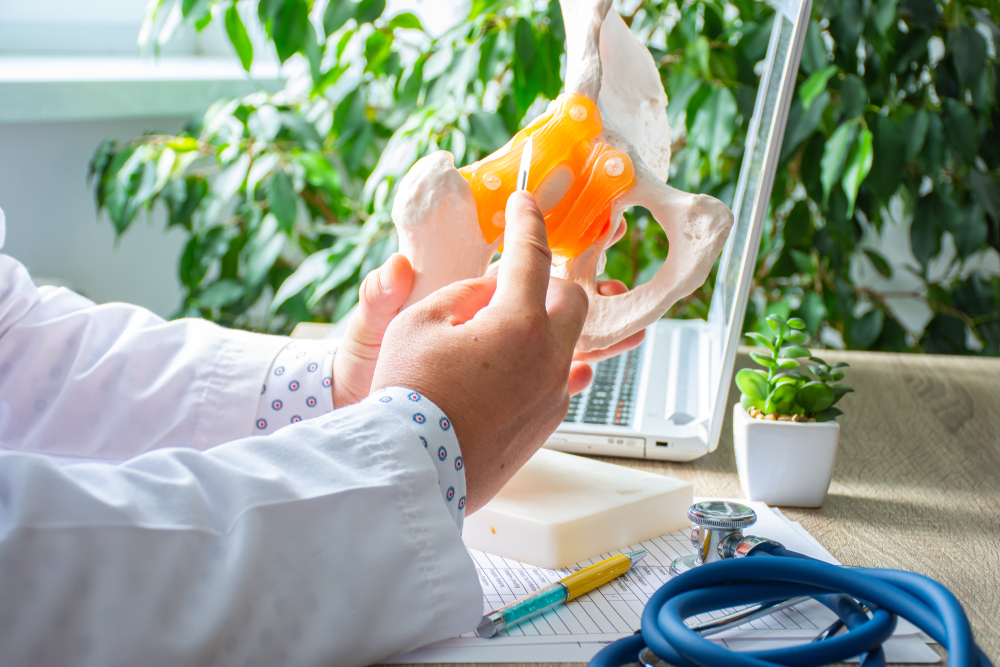

Locking of Hip Joints – Causes, Diagnosis, and Treatment at Emirates Hospitals Group
Locking of the hip joint is a condition where the joint becomes temporarily immobile or “locked,” causing discomfort, limited movement, and difficulty walking. This issue can significantly affect your quality of life, making daily activities challenging. At Emirates Hospitals Group, we offer advanced diagnosis and effective treatment options to address the causes of hip joint locking and help you regain normal function.
Causes of Locking of Hip Joints
Hip joint locking can result from various underlying conditions, often involving damage to the cartilage or surrounding tissues. Some common causes include:
- Labral Tears: The labrum is the cartilage that surrounds the hip joint. Tears or damage to the labrum can cause the joint to lock or click, leading to pain and restricted movement.
- Osteoarthritis: Degenerative arthritis can cause the cartilage in the hip joint to wear away, leading to bone-on-bone contact that can result in the joint locking or catching.
- Femoroacetabular Impingement (FAI): This condition occurs when the bones of the hip joint do not fit properly, leading to friction that can cause the joint to lock or feel stiff.
- Loose Bodies in the Joint: Fragments of bone or cartilage can break off within the hip joint, causing the joint to lock as these pieces move around inside.
- Bursitis: Inflammation of the bursae (fluid-filled sacs) around the hip joint can lead to pain, swelling, and reduced range of motion, sometimes causing a locking sensation.
- Hip Dislocation: A traumatic injury, such as a hip dislocation, can damage the surrounding ligaments and cartilage, leading to joint instability and locking.
- Tendon or Ligament Damage: Tears or inflammation in the tendons or ligaments around the hip joint can cause instability, leading to a feeling of locking.
- Labral or Cartilage Degeneration: As the cartilage within the hip joint deteriorates over time, it may cause the joint to “lock” due to the lack of smooth movement.
Symptoms of Hip Joint Locking
The most common symptoms associated with hip joint locking include:
- A sensation of the hip “locking” or “catching” during movement.
- Stiffness or difficulty moving the hip joint, particularly when standing up from a seated position or walking.
- Pain or discomfort in the hip, especially when moving or bearing weight on the affected leg.
- Audible popping or clicking sounds when the hip joint is in motion.
- Limited range of motion in the hip, especially when rotating or flexing the joint.
- Swelling or tenderness around the hip area.
Diagnosis of Locking of Hip Joints
To accurately diagnose the cause of hip joint locking, a comprehensive evaluation is essential. This may include:
- Physical Examination: The doctor will assess your range of motion, pain levels, and any signs of swelling or tenderness around the hip joint.
- Medical History: A review of your past injuries, medical conditions, or previous surgeries to identify potential contributing factors.
- X-rays: Imaging to evaluate the bone structure and detect conditions like arthritis, bone deformities, or signs of injury.
- MRI or Ultrasound: These imaging techniques help assess soft tissues such as cartilage, tendons, and ligaments to detect tears or inflammation.
- Arthroscopy: A minimally invasive procedure where a small camera is inserted into the joint to diagnose and sometimes treat problems like labral tears, cartilage damage, or loose bodies.
- CT Scan: A detailed scan to visualize bone structures and any deformities that may cause hip joint locking.
Treatment for Locking of Hip Joints in Dubai
Treatment for hip joint locking depends on the severity of the condition and the underlying cause. The treatment options may include:
- Physical Therapy: A personalized therapy program to strengthen the muscles around the hip joint, improve flexibility, and restore movement. Stretching and strengthening exercises can help improve joint function and reduce locking episodes.
- Medications: Pain-relieving medications like NSAIDs (nonsteroidal anti-inflammatory drugs) to reduce inflammation and manage pain. Corticosteroid injections may be used to reduce inflammation and improve mobility in the joint.
- Rest & Ice: Resting the hip and applying ice to reduce swelling and alleviate discomfort.
- Hip Bracing: A brace or support can help stabilize the joint and prevent further injury while promoting healing.
- Surgical Intervention: In cases of severe hip joint damage, such as labral tears, bone deformities, or advanced arthritis, surgery may be required. Options include hip arthroscopy to remove damaged tissue or perform repairs, or hip replacement surgery in cases of degenerative disease.
- Lifestyle Modifications: Maintaining a healthy weight, avoiding activities that exacerbate the condition, and using ergonomic movement techniques can reduce stress on the hip joint.
- Joint Lubrication Injections: Injections of hyaluronic acid can help lubricate the joint and reduce friction, improving movement and reducing pain.
- Platelet-Rich Plasma (PRP) Injections: This treatment involves injecting your own blood platelets into the affected area to promote healing of damaged tissues and reduce inflammation.
Request an appointment
Please complete the details and we will book you shortly.
